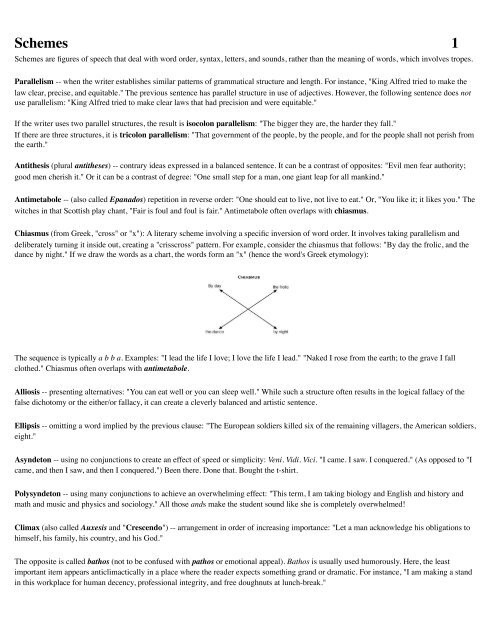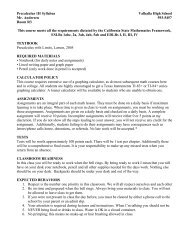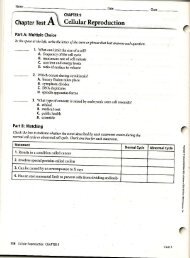Schemes 1
Schemes 1
Schemes 1
You also want an ePaper? Increase the reach of your titles
YUMPU automatically turns print PDFs into web optimized ePapers that Google loves.
<strong>Schemes</strong> 1<br />
<strong>Schemes</strong> are figures of speech that deal with word order, syntax, letters, and sounds, rather than the meaning of words, which involves tropes.<br />
Parallelism -- when the writer establishes similar patterns of grammatical structure and length. For instance, "King Alfred tried to make the<br />
law clear, precise, and equitable." The previous sentence has parallel structure in use of adjectives. However, the following sentence does not<br />
use parallelism: "King Alfred tried to make clear laws that had precision and were equitable."<br />
If the writer uses two parallel structures, the result is isocolon parallelism: "The bigger they are, the harder they fall."<br />
If there are three structures, it is tricolon parallelism: "That government of the people, by the people, and for the people shall not perish from<br />
the earth."<br />
Antithesis (plural antitheses) -- contrary ideas expressed in a balanced sentence. It can be a contrast of opposites: "Evil men fear authority;<br />
good men cherish it." Or it can be a contrast of degree: "One small step for a man, one giant leap for all mankind."<br />
Antimetabole -- (also called Epanados) repetition in reverse order: "One should eat to live, not live to eat." Or, "You like it; it likes you." The<br />
witches in that Scottish play chant, "Fair is foul and foul is fair." Antimetabole often overlaps with chiasmus.<br />
Chiasmus (from Greek, "cross" or "x"): A literary scheme involving a specific inversion of word order. It involves taking parallelism and<br />
deliberately turning it inside out, creating a "crisscross" pattern. For example, consider the chiasmus that follows: "By day the frolic, and the<br />
dance by night." If we draw the words as a chart, the words form an "x" (hence the word's Greek etymology):<br />
The sequence is typically a b b a. Examples: "I lead the life I love; I love the life I lead." "Naked I rose from the earth; to the grave I fall<br />
clothed." Chiasmus often overlaps with antimetabole.<br />
Alliosis -- presenting alternatives: "You can eat well or you can sleep well." While such a structure often results in the logical fallacy of the<br />
false dichotomy or the either/or fallacy, it can create a cleverly balanced and artistic sentence.<br />
Ellipsis -- omitting a word implied by the previous clause: "The European soldiers killed six of the remaining villagers, the American soldiers,<br />
eight."<br />
Asyndeton -- using no conjunctions to create an effect of speed or simplicity: Veni. Vidi. Vici. "I came. I saw. I conquered." (As opposed to "I<br />
came, and then I saw, and then I conquered.") Been there. Done that. Bought the t-shirt.<br />
Polysyndeton -- using many conjunctions to achieve an overwhelming effect: "This term, I am taking biology and English and history and<br />
math and music and physics and sociology." All those ands make the student sound like she is completely overwhelmed!<br />
Climax (also called Auxesis and "Crescendo") -- arrangement in order of increasing importance: "Let a man acknowledge his obligations to<br />
himself, his family, his country, and his God."<br />
The opposite is called bathos (not to be confused with pathos or emotional appeal). Bathos is usually used humorously. Here, the least<br />
important item appears anticlimactically in a place where the reader expects something grand or dramatic. For instance, "I am making a stand<br />
in this workplace for human decency, professional integrity, and free doughnuts at lunch-break."
<strong>Schemes</strong> 2<br />
<strong>Schemes</strong> that Break the Rules: How to Misspell Words and Ignore Grammar Like a Pro<br />
Enallage -- intentionally misusing grammar to characterize a speaker or to create a memorable phrase. Boxing manager Joe Jacobs, for<br />
instance, became immortal with the phrase, "We was robbed!" Or, the editors of Punch magazine might tell their British readers, "You pays<br />
your money, and you takes your chances."<br />
Anapodoton -- deliberately creating a sentence fragment by the omission of a clause: "If only you came with me!" If only students knew what<br />
anapodoton was! Good writers never use sentence fragments? Ah, but they can. And they do. When appropriate.<br />
Neologism -- creating a new or imaginary word. For example, Lewis Caroll writes: "'Twas brillig, and the slithy toves / did gyre and gimble in<br />
the wabe; / All mimsy were the borogoves, / and the mome raths outgrabe." His lines here contain numerous imaginary words--though these<br />
might be excessive in a rhetorical writing rather than a literary one like his poem. Many neologisms result from metaplasmus.<br />
Metaplasmus --a type of neologism in which misspelling a word creates a rhetorical effect. To emphasize dialect, one might spell dog as<br />
"dawg." To emphasize that something is unimportant, we might add -let or -ling at the end of the word, referring to a deity as a "godlet", or a<br />
prince as a "princeling." To emphasize the feminine nature of something normally considered masculine, try adding -ette to the end of the word,<br />
creating a smurfette or a corvette. To modernize something old, the writer might turn the Greek god Hermes into the Hermenator. Likewise,<br />
Austin Powers renders all things shagedelic. The categories following this entry are subdivisions of metaplasmus:<br />
• Prosthesis -- adding an extra syllable or letters to the beginning of a word: Shakespeare writes in his sonnets, "All alone, I beweep my<br />
outcast state." He could have simply wrote weep, but beweep matches his meter and is more poetic. Too many students are all afrightened<br />
by the use of prosthesis. Prosthesis creates a poetic effect, turning a run-of-the-mill word into something novel.<br />
• Epenthis (also called infixation) -- adding an extra syllable or letters in the middle of a word. Shakespeare might write, "A visitating spirit<br />
came last night" to highlight the unnatural status of the visit. More prosaically, Ned Flanders from The Simpsons might say, "Gosh-diddlydarn-it,<br />
Homer."<br />
• Proparalepsis -- adding an extra syllable or letters to the end of a word. For instance, Shakespeare in Hamlet creates the word climature<br />
by adding the end of the word temperature to climate (1.1.12). The wizardly windbag Glyndwr (Glendower) proclaims that he "can call<br />
spirits from the vasty deep" in 1 Henry IV (3.1.52).<br />
• Aphaearesis -- deleting a syllable from the beginning of a word to create a new word. For instance, in King Lear, we hear that, "the king<br />
hath cause to plain" (3.1.39). Here, the word complain has lost its first syllable. In Hamlet 2.2.561, Hamlet asks, "Who should 'scape<br />
whipping" if every man were treated as he deserved, but the e- in escape has itself cleverly escaped from its position!<br />
• Syncope -- deleting a syllable or letter from the middle of a word. For instance, in Cymbeline, Shakespeare writes of how, "Thou thy<br />
worldy task hast done, / Home art gone, and ta'en thy wages" (4.2.258). In 2 Henry IV, we hear a flatterer say, "Your lordship, though not<br />
clean past your youth, hath yet some smack of age in you, some relish of the saltness of time" (1.2.112). Here, the -i- in saltiness has<br />
vanished to create a new word. Syncope is particularly common in poetry, when desperate poets need to get rid of a single syllable to make<br />
their meter match in each line.<br />
• Apocope -- deleting a syllable or letter from the end of a word. In The Merchant of Venice, one character says, "when I ope my lips let no<br />
dog bark," and the last syllable of open falls away into ope before the reader's eyes (1.1.93-94). In Troilus and Cressida, Shakespeare<br />
proclaims, "If I might in entreaties find success--/ As seld I have the chance--I would desire / My famous cousin to our Grecian<br />
tents" (4.5.148). Here the word seldom becomes seld.
<strong>Schemes</strong> 3<br />
<strong>Schemes</strong> that Break the Rules: To the Winds Throwing Word Order!<br />
Hyperbaton -- a generic term for changing the normal or expected order of words. "One ad does not a survey make." The term comes from the<br />
Greek for "overstepping" because one or more words "overstep" their normal position and appear elsewhere. For instance, Milton in Paradise<br />
Lost might write, "High on a throne of royal gold . . . Satan exalted sat." In normal, everyday speech, we would expect to find, "High on a<br />
throne of royal gold . . . Satan sat exalted." Subtypes of hyperbaton appear below the examples here:<br />
"Arms and the man I sing"--Virgil<br />
"This is the sort of English up with which I will not put."--Variously attributed to Winston Churchill or Mark Twain<br />
"I was in my life alone"--Frost"Constant you are, but yet a woman"--1 Henry IV, 2.3.113<br />
"Grave danger you are in. Impatient you are." --Yoda, in Star Wars II: Attack of the Clones<br />
"From such crooked wood as state which man is made of, nothing straight can be fashioned." --Kant<br />
"pity this busy monster manunkind not." --e. e. cummings.<br />
Anastrophe -- A type of hyperbaton in which the adjective appears after the noun when we expect to find the adjective before the noun. For<br />
example, Shakespeare speaks of "Figures pedantical" (LLL 5.2.407). Faulkner describes "The old bear [. . .] not even a mortal but an<br />
anachronism indomitable and invincible out of an old dead time." T. S. Eliot writes of "Time present and time past," and so on.<br />
Hysteron-proteron -- Using anastrophe in a way that creates a catachresis (see under tropes); an impossible ordering on the literal level. For<br />
instance, Virgil has the despairing Trojans in the Aeneid cry out in despair as the city falls, "Let us die, and rush into the heart of the fight." Of<br />
course, the expected, possible order would be to "rush into the heart of the fight," and then "die." Literally, Virgil's sequence would be<br />
impossible unless all the troops died, then rose up as zombies and ran off to fight. In Antony and Cleopatra, Shakespeare writes, "I can behold<br />
no longer / Th'Antoniad, the Egyptian admiral, / With all their sixty, fly and turn the rudder" (3.10.1). We would expect to turn the rudder and<br />
then flee or fly, not fly and then turn the rudder!<br />
Hypallage -- Combining two examples of hyperbaton or anastrophe when reversed elements are not grammatically or syntactically parallel. It<br />
is easier to give examples than to explain hypallage. Virgil writes, "The smell has brought the well-known breezes" when we would expect, in<br />
terms of proper cause-and-effect, to have the breezes bring well-known smells. In Henry V, Shakespeare writes, "Our gayness and our gift are<br />
besmirched / With rainy marching in the painful field" (4.3.110), when logically we would expect "with painful marching in the rainy field."<br />
Roethke playfully states, "Once upon a tree / I came across a time." In each example, not just one hyperbaton appears, but two when the two<br />
words switch places with the two spots where we expect to find them. The result often overlaps with hysteron-proteron, in that it creates a<br />
catachresis (See under tropes).<br />
Tsmesis -- intentionally breaking a word into two parts for emphasis. Goldwyn once wrote, "I have but two words to say to your request: Im<br />
Possible." Milton writes, "Which way soever man refer to it." In one text of William Wordsworth's "The Tables Turned," we learn that "Our<br />
meddling intellect / Mis shapes the beauteous forms of things" (as opposed to misshapes). In English, this rhetorical scheme is fairly rare, since<br />
only the compounds of "ever" readily lend themselves to it, but it is much more common in Greek and Latin.
<strong>Schemes</strong> 4<br />
<strong>Schemes</strong> that Break the Rules: When Redundancy is not Redundant<br />
Alliteration -- repetition of a consonant in multiple words: buckets of big blue berries.<br />
Assonance -- repetition of vowel sounds: refresh your zest for living.<br />
Anaphora -- repetition of beginning clauses. For instance, Churchill declared, "We shall not flag or fail. We shall go on to the end. We shall<br />
fight in France, we shall fight on the seas and oceans. We shall fight with growing confidence and growing strength in the air. We shall defend<br />
our island, whatever the cost shall be."<br />
Epistrophe -- repetition of a concluding word or endings: "He's learning fast; are you earning fast?" When the epistrophe focuses on sounds<br />
rather than entire words, we normally call it rhyme.<br />
Epanalepsis -- repeating a word from the beginning of a clause at the end of the clause: "Year chases year." Or "Man's inhumanity to man." As<br />
Voltaire reminds us, "Common sense is not so common." As Shakespeare chillingly phrases it, "Blood will have blood." Under Biblical<br />
lextalionis one might demand "an eye for an eye, and a tooth for a tooth, a life for a life."<br />
Anadiplosis -- repeating the last word of a clause at the beginning of the next clause. As Nietzsche said, "Talent is an adornment; an adornment<br />
is also a concealment." Extended anadiplosis is called Gradatio. For instance, in The Caine Mutiny the captain declares: "Aboard my ship,<br />
excellent performance is standard. Standard performance is sub-standard. Sub-standard performance is not allowed." Biblically speaking, St.<br />
Paul claims, "We glory in tribulations also, knowing that tribulation worketh patience; and patience, experience; and experience, hope, and<br />
hope maketh man not ashamed." On a more mundane level, the character of Yoda states in Star Wars, Episode I: "Fear leads to anger; anger<br />
leads to hatred; hatred leads to conflict; conflict leads to suffering." Gradatio creates a rhythmical pattern to carry the reader along the text, even<br />
as it establishes a connection between words.<br />
Diacope (also called Epizeuxis or Repetition) -- uninterrupted repetition, or repetition with only one or two words between each repeated<br />
phrase. Poe might cry out, "Oh, horror, horror, horror!"<br />
Symploce -- Repeating words at both the beginning and the ending of a phrase: In St. Paul's letters, he seeks symploce to reinforce in the reader<br />
the fact that his opponents are no better than he is: "Are they Hebrews? So am I. Are they Israelites? So am I. Are they of the seed of Abraham?<br />
So am I."




